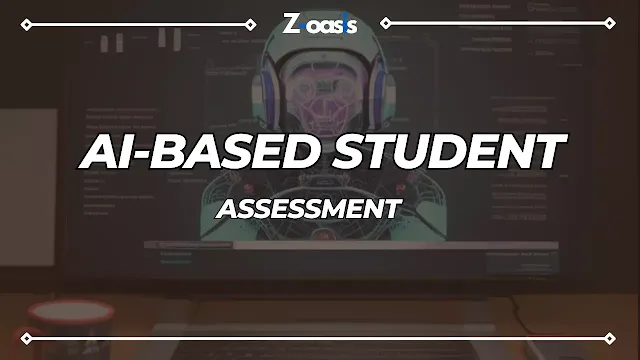In our ever-evolving world, the education sector has seen a remarkable shift in the way student performance is assessed, and it's all thanks to artificial intelligence or AI. Before AI, it was all quizzes, assignments, and standardized tests, but the tide has turned. AI has revolutionized the education sector, offering a more efficient and personalized approach to student assessment, plus the ability to analyze data on a large scale. So, let's navigate through this fascinating world and examine how AI shapes student assessment.
 |
| AI-based Student Assessment |
AI-Enhanced Student Assessment
Ever set your hands on a marking scheme to grade a bunch of assignments? It's a hefty task, right? But, with AI, grading has taken shape as more than just a time-saving tool. AI algorithms can go through and evaluate student responses, whether in quizzes, tests, or homework. You're not only freeing up teacher's time, but also providing quick feedback to the students.
Grading with AI Power
AI-powered grading systems use machine learning methods to contrast student answers with pre-set models or patterns, assessing how correct and quality each response is. Think of it as a 'teacher's assistant', tasked with grading papers.
Faster grading translates to quicker feedback for students, which means they can learn from their mistakes swiftly and improve accordingly. As an added bonus, these systems can accommodate a large number of assessments while maintaining fairness and consistency in evaluations.
Smart Assessment Systems
Switching gears, we come across intelligent assessment systems. These systems, armed with machine learning, can mold assessments to fit each student's proficiency level. Not only does this maintain student engagement, but it also ensures they are challenged appropriately.
These smart systems can also give deep insights into student performance by identifying struggling areas and suggesting targeted interventions. With such data-driven knowledge, teachers can make evidence-based instructional decisions that could ultimately enhance student learning.
Assessing Essays with Natural Language Processing
Traditionally, marking essays used to consume a considerable chunk of a teacher's time, but AI has changed the game. Specifically, the use of natural language processing (NLP) has redefined how written work is assessed. NLP algorithms can evaluate the coherence, structure, and content of essays, providing balanced and consistent evaluations.
Using this innovative approach, AI systems can assess written assignments' quality using parameters like grammar, vocabulary, organization, and even argumentation. Moreover, they can offer constructive criticism on areas students need to work on, aiding in the development of their writing skills. By automating this process, teachers save precious time which can be utilized elsewhere in instruction.
Performance Tracking with Data Analytics
An AI-based student assessment also employs data analytics for tracking student performance. By collecting and analyzing data from various resources like engagement metrics, attendance records, and assessments, these systems paint a comprehensive picture of a student's progress.
Data analytics help teachers identify patterns and trends, hence understanding individual learning needs. This way, instruction can be personalized to each student's needs improving their learning outcomes in the process.
Dynamic Feedback and Recommendations
One key feature of AI-based systems is their ability to provide dynamic feedback tailored to each student's performance. This personalized feedback can help students understand their mistakes and learn how to improve next time.
In addition, the system can give personalized suggestions for other learning activities or resources based on each student's performance. This can help solidify the students' understanding and improve their weak areas.
Ethical Considerations in AI-Based Assessments
With all these benefits AI brings to the education sector, it's also important to address the elephant in the room—the ethical considerations. For instance, when considering privacy and data security, it's important to handle student data responsibly and adhere to strict privacy laws and regulations.
Also, fairness and bias in AI algorithms are key concerns that must be addressed to maintain equitable assessment practices. It's essential that AI systems minimize bias and give assessments that are fair to all students, regardless of factors like their background. Lastly, transparency in AI algorithms is necessary to ensure students understand how they're being graded.
To sum it all up, while AI assessments offer many benefits and have the potential to turn around the education system by providing effective, personalized, and data-centred evaluation methods, we need to approach it responsibly. Privacy, minimizing bias, and promoting fair practices should be at the forefront.